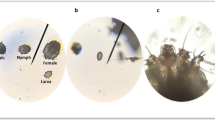Abstract
The role of excretory–secretory metabolites of Fasciola gigantica in modulating the delayed type of hypersensitivity in the host (rats) was investigated. Eighteen rats of either sex, aged 3–4 months, were assigned to three groups of 6 animals each. Rats in group 1 served as non-inoculated controls and each rat in this group was administered only Freund's complete adjuvant on day 7. Animals in groups 2 and 3 were administered inoculation dose(s) of somatic F. gigantica antigen (SFgA) and excretory–secretory F. gigantica antigens (ESFgA) according to the experimental schedule. The delayed-type hypersensitivity was monitored by assessing alterations in the foot pad thickness, its histopathology and lymphocyte proliferation assay. It was observed that the ESFgA caused diminution in delayed-type hypersensitivity response to a significant level (p<0.01) against SFgA in rats. This finding was further confirmed by lower stimulation indices of peripheral blood mononuclear cell in rats sensitized with ESFgA prior to inoculation of SFgA (group 1) than in nonsensitized rats receiving only SFgA (group 2).
Similar content being viewed by others
REFERENCES
Beltz, L.A., Sztein, M.B. and Kierszenbaum, F., 1988. Novel mechanism for Trypanosoma cruzi induced suppression of human lymphocytes. Inhibition of IL-2 receptor expression. Journal of Immunology, 141, 289-294
Boyum, A., 1968. Ficoll hypaque method for separation of mononuclear cells from human blood. Clinical Investigations, 21, 1
Cervi, L., Rubinstein, H.R. and Masih, D.T., 1996. Involvement of excretion-secretion products from Fasciola gigantica in inducing suppression of cellular immune response. Veterinary Parasitology, 61, 97-111
Goose, J., 1978. Possible role of excretory—secretory products in evasion of host defenses by Fasciola hepatica. Nature, 275, 216-217
Jefferies, J.R., Turner, R.J. and Barrett, J., 1997. Effect of Fasciola hepatica excretory—secretory products by infection with F. hepatica. Experimental Parasitology, 5, 458-468
Lowry, O.H., Rosenbrough, N.J., Farr, A.L. and Randal, R.J., 1951. Protein measurement with the Folin phenol reagent. Journal of Biological Chemistry, 193, 265-275
Mellouk, S., Maheshwari, R.K., Rodhes-Feuillette, A., Beaudoin, R.L., Berbiguier, N., Matile, M., Miltgen, F., Landau, I., Pied, S., Chigot, J.P., Friedman, R.M. and Mazier, D., 1987. Inhibitory activity of interferons and interleukin-1 on the development of Plasmodium falciparum in human hepatocyte culture. Journal of Immunology, 139, 4192-4195
Mosmann, T., 1983. Rapid colorimetric assay for cellular growth and survival. Application to proliferation and cytotoxicity assay. Journal of Immunological Methods, 65, 55-63
Perrin, P.J. and Phillips, S.M., 1988. The molecular basis of granuloma formation in schistosomiasis. I. A cell derived suppressor—effector factor. Journal of Immunology, 141, 1714-1719
Rakha, N.K., Dixon, J.B., Skerritt, G.C., Carter, S.D. and Jenkins, P., 1992. Modification of accessory activity of sheep monocyte in vitro by a coenurus antigen from Taenia multiceps. Veterinary Immunology and Immunopathology, 30, 293-304
Tarleton, R.L., 1988. Trypanosoma cruzi induced suppression of IL-2 production. 1. Evidence for the presence of IL-2 production cells. Journal of Immunology, 140, 2763-2768
Wakelin, D., 1984. Immunity to Parasites. How Animals Control Parasitic Infection, (Edward Arnold, London)
Zimmerman, G.L., Kerkvliet, N.I., Brauner, J.A. and Cerro, J.E., 1983. Modulation of host immune responses by Fasciola hepatica: responses by peripheral lymphocytes to mitogens during liver fluke infections of sheep. Journal of Parasitology, 69, 473-477
Author information
Authors and Affiliations
Rights and permissions
About this article
Cite this article
Ganga, G., Varshney, J. & Sharma, R. Role of Excretory–Secretory Metabolites of Fasciola gigantica in Modulating Delayed-type Hypersensitivity in Rats. Vet Res Commun 28, 387–393 (2004). https://doi.org/10.1023/B:VERC.0000035025.79686.05
Issue Date:
DOI: https://doi.org/10.1023/B:VERC.0000035025.79686.05




